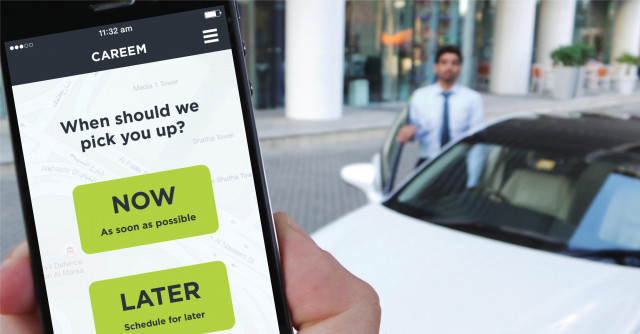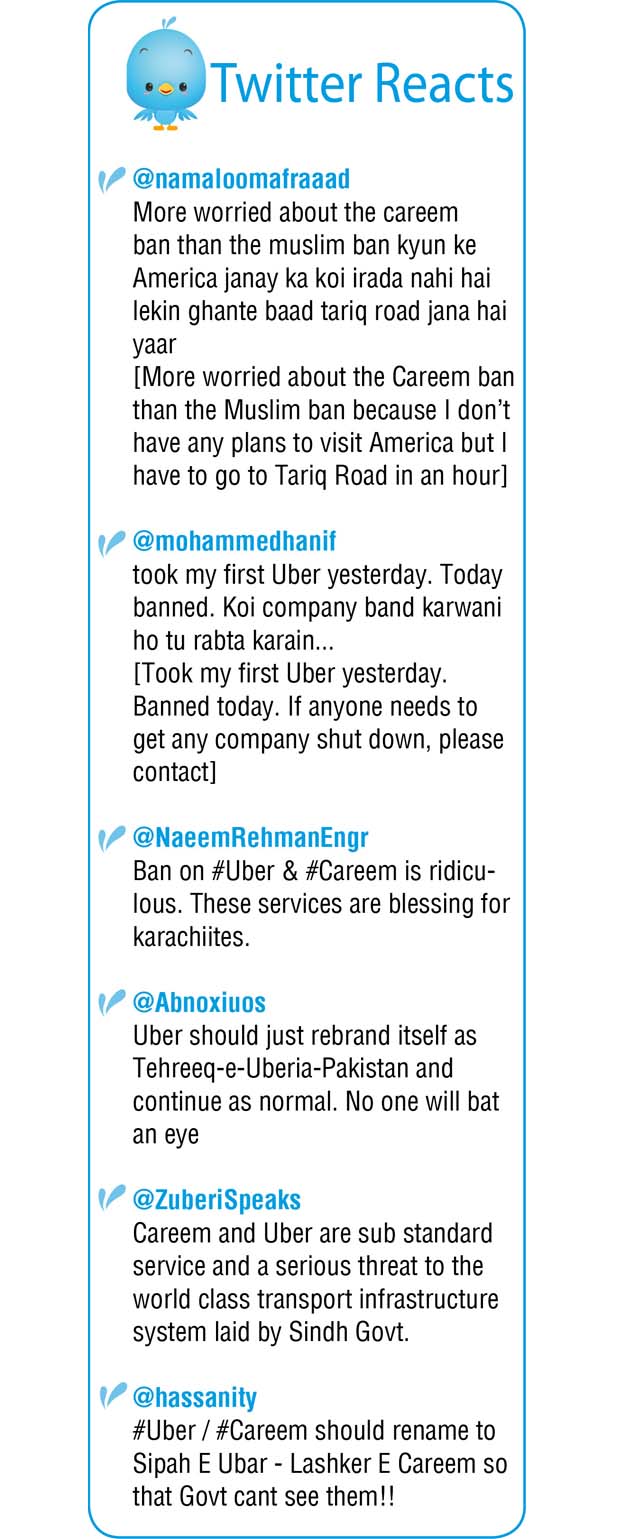Fear of ban on ride-hailing apps upsets Karachi
Govt insists Uber, Careem must comply with vehicles’ fitness requirements

PHOTO: CAREEM
Rabia Tanveer, who lives in Singapore, had plans to visit Karachi this month along with her newborn baby. “I was so happy that I will be able to travel safe and sound with the baby as my husband is not travelling with us,” she said. “How can one travel in rickshaws and public buses on the broken roads of the city,” she said.
The current state of public transportation in the city leaves fewer options for commuters, especially women, who are frequently harassed on buses and at bus stops.
14 priceless tweets on Careem, Uber 'ban'

Facebook and Twitter newsfeeds were flooded with posts against the Sindh government’s letter to request the ban of the two services. Syed Ghazanfar Hussain posted a photograph of a rickety public bus teeming with commuters on its roof and wondered how such buses have cleared the fitness and safety test but Uber and Careem are declared illegal.
Another Careem user, Darakshan Khan, said that the government must realise that public buses are a safety hazard while these new apps are providing cosy rides at cheaper rates. The government is bent on banning it just to please the transport mafia, she claimed.
Nimra Mukhtar also shared how travelling has become easier since the launch of Careem and Uber. “I no longer had to hang myself in public buses neither do I need to argue with rickshaw drivers at bus stops,” she said.
Here's why people are deleting Uber from their smartphones
Fitness regime
The reason why the Sindh government has a bone to pick with these ride-hailing apps is because of an issue with fitness certificates and no-objection certificates (NOCs).
There are three types of NOCs that the management of Careem and Uber were supposed to obtain, said Sindh transport secretary Tuaha Farooqui. “When private cars are used as commercial vehicles, they have to pay Rs150 annually to the Excise and Taxation department,” he told The Express Tribune. “However, they are not required to change their number plates.”
The management of the two companies have to get registered with the Regional Transport Authority (RTA) and also need to obtain fitness certificates, he said, adding that once these requirements are fulfilled, they can operate freely.
“There is a huge difference between the common ‘kaali peeli’ [black, yellow] taxis, mini buses and these [Careem and Uber vehicles]. They are the corporate sector,” said Farooqui. “If they fulfil all legal requirements in the rest of the world, then why not Pakistan?” he asked.

He assured the government has no plans to ban these services. “Uber is a service I welcomed to this city,” he said, adding more such services will be welcomed if they fulfil the laws.
According to him, they have written around 12 letters to Careem to comply with the legal issues. As for Uber, Farooqui said their management committed to go through the legal processes but only eight of their vehicles were registered. As for now, he said that they have written to the Pakistan Telecommunication Authority (PTA) to block their services but the services have been given a one-month grace period.
Careem’s marketing executive Tanzeela Aslam said that their partner company, Pak Wheel, has a subsidiary company called Car Sure, which inspects each and every one of their cars.
Sindh, Punjab govts move to 'ban' Careem, Uber
Meanwhile, Traffic DIG Asif Ejaz Shaikh said that they received a letter from the transport secretary, a copy of which is also available with The Express Tribune, asking them to immediately stop Careem’s “illegal operations” under Motor Vehicle Ordinance, 1965’s sections 39 and 44.
Shaikh also shared the strategy they had devised to trap these cars once the ban was enforced. “Most of these cars do not have any signs so we would have booked them through the app and then caught them once they arrived,” he explained. But since Sindh Transport Minister Nasir Hussain Shah gave the two companies a month to ensure compliance, Shaikh clarified that they will not take any action for a month at least.
In a Facebook live video on Tuesday, Careem Pakistan managing director Junaid Iqbal said new laws are being drafted for ride-hailing services across the world. “In India, the issue is being debated in the parliament,” he said.
Published in The Express Tribune, February 1st, 2017.



















COMMENTS
Comments are moderated and generally will be posted if they are on-topic and not abusive.
For more information, please see our Comments FAQ